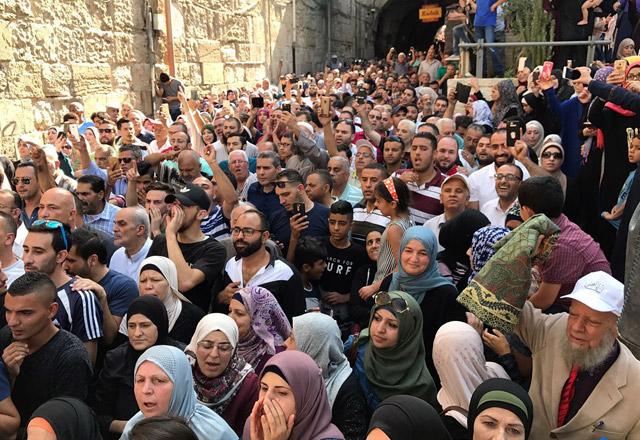You are here
Thousands rush to pray at Jerusalem’s Al Aqsa Mosque amid tension
By Reuters - Jul 27,2017 - Last updated at Jul 27,2017

Palestinians gather in front of Al Haram Al Sharif to celebrate after Israeli authorities decided to remove metal detectors from Al Asbat Gate of Al Aqsa compound in Jerusalem on Thursday (Anadolu Agency photo)
OCCUPIED JERUSALEM — Thousands of Muslim worshippers rushed to pray at Jerusalem's Al Aqsa Mosque in chaotic scenes on Thursday after Israel backed down and removed security measures it had installed at the sacred site.
At least 37 Palestinians were injured as Israeli occupation forces used sound bombs to control crowds of worshippers surging forth once the last gate Muslims are allowed to use to enter Al Aqsa was opened after a stand-off of several hours.
Israel's removal of the measures, including metal detectors and CCTV cameras, marked a significant climbdown by Prime Minister Benjamin Netanyahu. While Palestinians celebrated, political opponents accused him of weakness.
Netanyahu's decision followed days of diplomatic effort by the United Nations, the involvement of President Donald Trump's Middle East envoy and pressure from countries in the region, including Jordan, Turkey and Saudi Arabia.
The dispute began after Israel installed metal detectors at Muslim entrances to Al Aqsa compound.
The unannounced move provoked days of unrest, with violent confrontations on the streets of East Jerusalem. Israeli forces shot dead four Palestinians, and a Palestinian man stabbed and killed three Israelis in their home in the Israeli-occupied West Bank.
For the past two weeks, most Muslims have refused to enter, instead praying in the streets around the Old City.
Earlier on Thursday, Muslim elders declared themselves satisfied that Israeli authorities had removed all the new measures — mainly metal detectors and CCTV cameras — and reverted to the set-up before July 14.
“The technical report showed that all obstacles the occupation [Israel] put outside Al Aqsa Mosque were removed,” said Abdel-Azeem Salhab, the head of the Waqf, the Jordanian-funded trust that oversees Jerusalem’s Muslim holy sites.
“We praise this stand in the past two weeks outside Al Aqsa and we want this stand to continue outside Al Aqsa and now inside Al Aqsa,” he said, urging worshippers to return to pray.
Palestinian political factions issued statements supporting the Waqf, which looked likely to help defuse the unrest. Before the announcement, factions had been calling for a “day of rage” on Friday, raising concerns about another round of violence.
Jordan has been custodian of the Muslim holy sites in Jerusalem since 1924, said Israel’s removal of the extra security measures was an “essential step to calm the situation”.
Multi-faceted dispute
Palestinian political factions were quick to highlight what they saw as a rare victory over Israel. A spokesman for Netanyahu declined to comment, but right-wing leaders criticised the premier for what they regarded as weakness.
“Israel is emerging weakened from this crisis, to my regret,” said Education Minister Naftali Bennett, whose national religious Jewish Home Party is in Netanyahu’s coalition and who is a potential challenger for the leadership.
“The truth must be stated. Instead of bolstering our sovereignty in Jerusalem, a message was relayed that our sovereignty can be shaken.”
Netanyahu said the extra security was needed to ensure safety at the site, which is popular with tourists. But by taking the steps to bolster security, Israel was materially changing the sensitive status quo, which has governed movement and religious practice for decades.
The Noble Sanctuary contains Al Aqsa Mosque, the third holiest shrine in Islam, and the golden Dome of the Rock. The area, which sits on a tree-lined marble plateau in the heart of the Old City, is the holiest place in Judaism, the location of two ancient temples, the last destroyed by the Romans.
The dispute, like many in the Holy Land, is about more than security devices, taking in issues of sovereignty, religious freedom, occupation and Palestinian nationalism.
Israel captured Jerusalem, including the Old City and the holy compound, in the 1967 Middle East war. It annexed the area and declared it part of its “indivisible capital”.
This has never been recognised internationally, with the United Nations and others regarding East Jerusalem as occupied by Israel and maintaining that the status of the city can only be determined through negotiations between the parties.
Palestinians do not recognise Israel’s authority in East Jerusalem, which they want as the capital of a future Palestinian state, and are extremely sensitive to the presence of Israeli forces in and around the Noble Sanctuary.
Related Articles
OCCUPIED JERUSALEM — Israel removed metal detectors from entrances to Al Aqsa Mosque compound in Jerusalem's Old City on Tuesday in favour o
OCCUPIED JERUSALEM — Israeli occupation forces killed three Palestinians on Friday, imposing new Israeli measures at Jerusalem's holiest sit
OCCUPIED JERUSALEM — A tense standoff was under way between Israel and Muslim worshippers at a Jerusalem holy site Wednesday despite the rem













